历年全国大学生英语辩论赛辩题
英语辩论赛辩题大全_辩论赛_
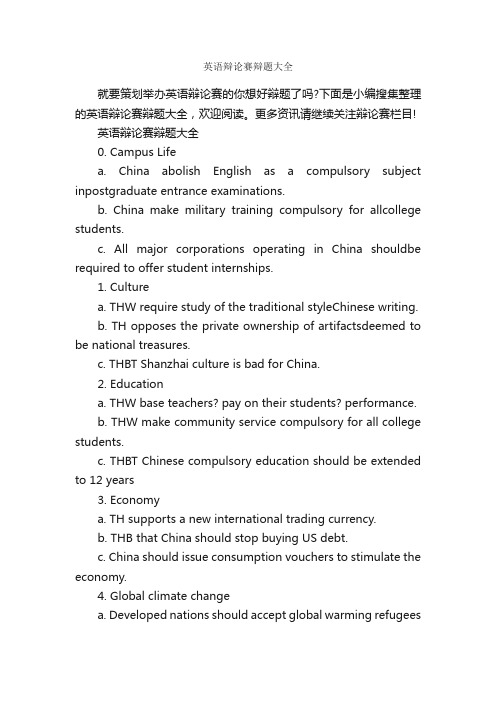
英语辩论赛辩题大全就要策划举办英语辩论赛的你想好辩题了吗?下面是小编搜集整理的英语辩论赛辩题大全,欢迎阅读。
更多资讯请继续关注辩论赛栏目!英语辩论赛辩题大全0. Campus Lifea. China abolish English as a compulsory subject inpostgraduate entrance examinations.b. China make military training compulsory for allcollege students.c. All major corporations operating in China shouldbe required to offer student internships.1. Culturea. THW require study of the traditional styleChinese writing.b. TH opposes the private ownership of artifactsdeemed to be national treasures.c. THBT Shanzhai culture is bad for China.2. Educationa. THW base teachers? pay on their students? performance.b. THW make community service compulsory for all college students.c. THBT Chinese compulsory education should be extended to 12 years3. Economya. TH supports a new international trading currency.b. THB that China should stop buying US debt.c. China should issue consumption vouchers to stimulate the economy.4. Global climate changea. Developed nations should accept global warming refugeesb. Those affected by global climate change should have the right to sue major carbon-emitting nations.c. China should cap its carbon emissions.5. East Asiaa. Immediate elections are in Thailand抯 best interest.b. ASEAN should expel Myanmarc. Direct negotiations between the US and North Korea are preferable to the Six-Party Talks.6. Family & Populationa. THBT women should be allowed to sell their eggsb. TH would require the father抯 consent for abortions.c. China should legalize marriage between homosexuals.7. Crime & Punishmenta. Criminals sentenced to life imprisonment without parole should be allowed to choose deathinstead.b. China should establish a national DNA database of all citizens for the purposes of criminalinvestigations.c. This house would make parents liable for their children抯crimes.8. Governing & Governmenta. THW make one-year military service a qualification for public servants.b. TH would require government officials to make full financial disclosure to the public.c. THW make all NPC representatives full-time, professional legislators.Octofinals: Medical servicea. China should ban hymen reconstruction surgeries.b. China should legalize physician-assisted suicide.c. The World Health Organization (WHO) should have theauthority to quarantine in times ofhealth crises.Quarterfinals: Judiciarya. China should apply capital punishment only to homicide cases.b. China should fully establish a jury-by-peers system.c. Judges should be elected.Semifinals: International IssuesSEMIFINAL #1a. The Shanghai Cooperation Organization should admit Iran as a full member.b. The United Nations should take control of Jerusalem.c. NATO should fully withdraw from Afghanistan before 2019.SEMIFINAL #2a. The USA should stop promoting democracy as part of their foreign policy.b. Pre-emptive strikes on Somalia to curb piracy are justified.c. This house supports Spain抯criminal prosecution of members of the Bushadministration.FinalsThe PRC should ban the production, sale and consumption of all tobacco products.英语辩论赛常用语A征求他人观点或意见的用语I would be glad to hear your opinion of … 我很乐意听听你对……的意见。
英语辩论相关作文题目大全
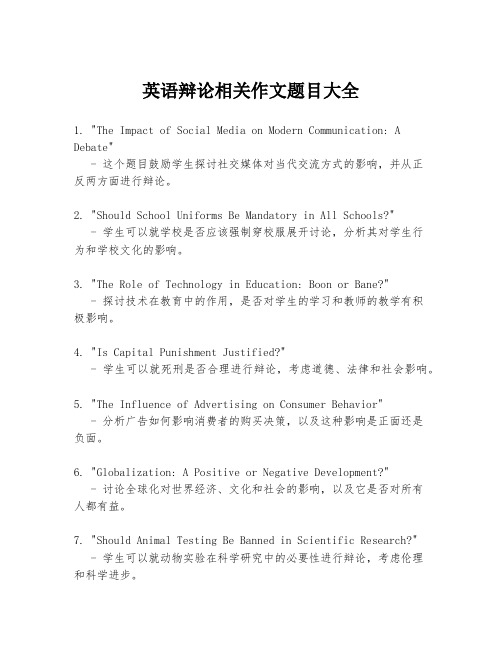
英语辩论相关作文题目大全1. "The Impact of Social Media on Modern Communication: A Debate"- 这个题目鼓励学生探讨社交媒体对当代交流方式的影响,并从正反两方面进行辩论。
2. "Should School Uniforms Be Mandatory in All Schools?"- 学生可以就学校是否应该强制穿校服展开讨论,分析其对学生行为和学校文化的影响。
3. "The Role of Technology in Education: Boon or Bane?"- 探讨技术在教育中的作用,是否对学生的学习和教师的教学有积极影响。
4. "Is Capital Punishment Justified?"- 学生可以就死刑是否合理进行辩论,考虑道德、法律和社会影响。
5. "The Influence of Advertising on Consumer Behavior"- 分析广告如何影响消费者的购买决策,以及这种影响是正面还是负面。
6. "Globalization: A Positive or Negative Development?"- 讨论全球化对世界经济、文化和社会的影响,以及它是否对所有人都有益。
7. "Should Animal Testing Be Banned in Scientific Research?"- 学生可以就动物实验在科学研究中的必要性进行辩论,考虑伦理和科学进步。
8. "The Importance of Learning a Second Language"- 探讨学习第二语言的好处,包括个人发展、职业机会和跨文化交流。
9. "Online Education vs. Traditional Classroom Learning: Which Is More Effective?"- 比较在线教育和传统课堂教学的优劣,分析哪种方式更适合现代学习。
英语辩论赛辩题和答案(3篇)
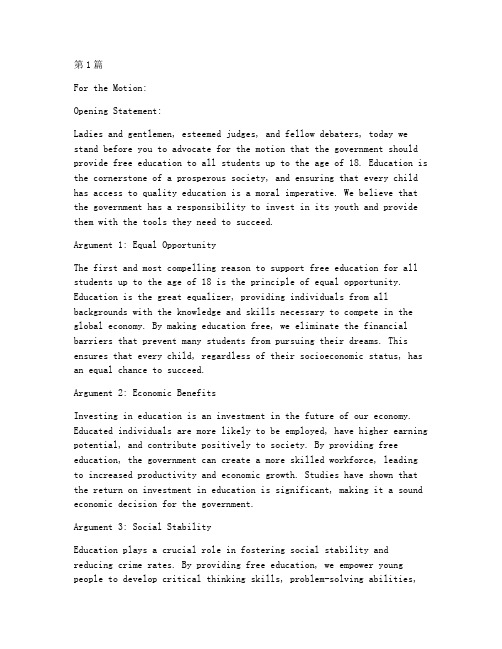
第1篇For the Motion:Opening Statement:Ladies and gentlemen, esteemed judges, and fellow debaters, today we stand before you to advocate for the motion that the government should provide free education to all students up to the age of 18. Education is the cornerstone of a prosperous society, and ensuring that every child has access to quality education is a moral imperative. We believe that the government has a responsibility to invest in its youth and provide them with the tools they need to succeed.Argument 1: Equal OpportunityThe first and most compelling reason to support free education for all students up to the age of 18 is the principle of equal opportunity. Education is the great equalizer, providing individuals from all backgrounds with the knowledge and skills necessary to compete in the global economy. By making education free, we eliminate the financial barriers that prevent many students from pursuing their dreams. This ensures that every child, regardless of their socioeconomic status, has an equal chance to succeed.Argument 2: Economic BenefitsInvesting in education is an investment in the future of our economy. Educated individuals are more likely to be employed, have higher earning potential, and contribute positively to society. By providing free education, the government can create a more skilled workforce, leading to increased productivity and economic growth. Studies have shown that the return on investment in education is significant, making it a sound economic decision for the government.Argument 3: Social StabilityEducation plays a crucial role in fostering social stability and reducing crime rates. By providing free education, we empower young people to develop critical thinking skills, problem-solving abilities,and a sense of civic responsibility. Educated individuals are lesslikely to engage in criminal activities and more likely to be active, productive members of society. This investment in education can lead to a safer, more harmonious community.Argument 4: Moral ResponsibilityLastly, the government has a moral responsibility to ensure that all children have access to education. Education is a fundamental human right, and denying access to it based on financial constraints is a violation of that right. By providing free education, the government demonstrates its commitment to social justice and equity, ensuring that no child is left behind.Rebuttal:While the opposition may argue that free education is unaffordable or that it would lead to a decline in educational quality, these concerns can be addressed. First, the cost of providing free education can be offset by the economic benefits it generates. Second, ensuring quality education is not solely dependent on fees; it requires a comprehensive approach that includes well-trained teachers, modern facilities, and effective educational policies.Closing Statement:In conclusion, providing free education to all students up to the age of 18 is a necessary and beneficial policy. It ensures equal opportunity, fosters economic growth, promotes social stability, and fulfills the government's moral responsibility. We ask you to vote in favor of the motion and support the future of our children and our society.---Against the Motion:Opening Statement:Thank you, esteemed judges, and fellow debaters. We are here to argue against the motion that the government should provide free education toall students up to the age of 18. While the idea of free education may seem noble, it is impractical and fraught with consequences that could undermine the quality of education and the financial stability of the government.Argument 1: Financial BurdenThe primary concern with the motion is the financial burden it places on the government. Education is expensive, and providing free education to millions of students would require a significant allocation of resources. This could lead to cuts in other essential services, such as healthcare, infrastructure, and social welfare. The government must prioritize its spending to ensure that it can meet the needs of its citizens effectively.Argument 2: Quality of EducationAnother critical issue is the potential impact on the quality of education. When the government provides free education, it may be tempted to increase the number of students to maximize its investment. This could lead to overcrowded classrooms, understaffed schools, and a decline in the overall quality of education. It is essential to maintain high standards to ensure that students receive a valuable education that prepares them for future challenges.Argument 3: Incentive for Personal ResponsibilityEducation should be seen as a personal responsibility, and charging fees can serve as an incentive for students to value their education. When students are financially invested in their education, they are morelikely to take it seriously and perform better. Removing this financial barrier may lead to a decrease in student motivation and a rise in dropout rates.Argument 4: Alternative SolutionsInstead of providing free education, the government can explore alternative solutions that address the issue of accessibility. Thiscould include targeted scholarships, student loans with favorable terms,or partnerships with private institutions. These approaches can ensure that students from low-income families receive the support they need without burdening the government's budget.Rebuttal:The proponents may claim that the economic benefits of education justify the financial investment, but this overlooks the long-term costs of maintaining a high-quality education system. Moreover, the governmenthas a duty to manage its resources responsibly, and free education could lead to unsustainable spending practices.Closing Statement:In conclusion, while the desire to provide free education is commendable, it is not a viable solution. The financial burden, potential decline in educational quality, lack of personal responsibility, and alternative solutions make it clear that the government should not adopt this policy. We ask you to reject the motion and consider the long-term implications of such a decision.---This debate provides a framework for discussing the complexities of providing free education to all students up to the age of 18. Both sides present compelling arguments, and the final decision would depend on the priorities and values of the society in question.第2篇Side A: In Favor of Standardized TestingArgument 1: Ensuring Academic Standards- Standardized tests provide a common benchmark for evaluating student performance across different schools and regions. This ensures that all students are held to the same high academic standards, regardless oftheir background or the resources available to their schools.- By requiring a standardized test before graduation, schools can ensure that students have achieved a minimum level of proficiency in coresubjects, which is essential for their future success in higher education and the workforce.Argument 2: Identifying Areas for Improvement- Standardized tests often reveal specific areas where students are struggling. This information can be used by teachers and administrators to tailor their instruction and interventions to address these weaknesses, thereby improving overall student performance.- The data from standardized tests can also help identify trends and patterns that may indicate broader educational issues, such as a lack of access to quality resources or a need for additional support services.Argument 3: Promoting Accountability- Requiring a standardized test before graduation holds schools accountable for their educational outcomes. It incentivizes schools to focus on student achievement and to provide the necessary support forall students to succeed.- Accountability can also extend to teachers, who may be more motivated to deliver effective instruction if they know their performance will be evaluated based on student test scores.Answer to Counterarguments:Counterargument 1: Standardized Tests Do Not Measure True Learning- While it is true that standardized tests may not capture the full breadth of a student's knowledge and skills, they do measure certain critical aspects of learning, such as basic comprehension and problem-solving abilities. These are essential skills that students need to succeed in the real world.- Additionally, schools can use a variety of assessment methods to complement standardized tests, providing a more comprehensive picture of student learning.Counterargument 2: Standardized Tests Create Stress and Pressure- It is important to recognize that standardized tests can indeed create stress and pressure for students. However, this can be mitigated by implementing appropriate test preparation strategies and by creating a supportive testing environment.- Moreover, the benefits of ensuring academic standards and promoting accountability outweigh the potential negative effects of test stress.Counterargument 3: Standardized Tests Can Be Subjective and Biased- It is true that standardized tests can be influenced by factors such as socioeconomic status and cultural background. However, efforts are continually being made to improve the fairness and objectivity of these tests.- Additionally, schools can use the results to identify and address disparities, rather than using them as the sole measure of student performance.Side B: Against Standardized TestingArgument 1: Restricting Personalized Learning- Standardized tests can limit the flexibility of teachers to tailor their instruction to the individual needs of their students. This can result in a one-size-fits-all approach that does not cater to the diverse learning styles and abilities of students.- By focusing on test preparation, schools may prioritize rote learning and memorization over critical thinking and creativity, which are essential skills for the 21st century.Argument 2: Overemphasizing Test Scores- An overemphasis on standardized test scores can lead to a narrow focus on academic performance at the expense of other important educational outcomes, such as social-emotional development, physical health, and the arts.- This narrow focus can also create a competitive and stressful environment for students, which may have long-term negative effects on their well-being.Argument 3: Disproportionate Impact on Marginalized Students- Standardized tests can disproportionately impact marginalized students, who may face additional challenges such as language barriers, lack of access to resources, or discrimination.- The pressure to perform well on these tests can exacerbate existing inequalities and hinder the educational opportunities of these students.Answer to Counterarguments:Counterargument 1: Standardized Tests Provide a Consistent Measure of Student Performance- While standardized tests do provide a consistent measure of student performance, they should not be the sole measure. Schools should use a variety of assessment methods to ensure a well-rounded evaluation of student learning.- Moreover, standardized tests can be used as one tool among many to inform instruction and support students, rather than as the primary focus.Counterargument 2: Test Scores Do Not Reflect the Entire Educational Experience- It is true that test scores do not reflect the entire educational experience, but they do provide valuable information about certain aspects of student learning. This information can be used to identify strengths and weaknesses and to inform educational strategies.- The goal should be to use standardized test results as part of a larger, more holistic approach to student assessment.Counterargument 3: Efforts Can Be Made to Mitigate the Disproportionate Impact- While it is important to acknowledge the disproportionate impact of standardized tests on marginalized students, efforts can be made to mitigate this impact. This includes providing additional support and resources to these students, as well as using alternative assessment methods that are more equitable.In conclusion, while standardized testing has its drawbacks, thebenefits of ensuring academic standards, identifying areas for improvement, and promoting accountability make it a necessary component of the educational system. By using standardized tests as one tool among many and addressing the concerns of fairness and equity, schools can create a more balanced and effective approach to student assessment and support.第3篇Should governments around the world prioritize the development of renewable energy sources over the expansion of fossil fuel infrastructure?Answer for the Proposition (Pro):Introduction:The proposition argues that governments worldwide should prioritize the development of renewable energy sources over the expansion of fossilfuel infrastructure. This stance is supported by the urgent need to combat climate change, enhance energy security, and foster sustainable economic growth.Argument 1: Climate Change MitigationThe primary reason for prioritizing renewable energy is the urgent need to mitigate climate change. Fossil fuels are the largest contributors to greenhouse gas emissions, which are causing global temperatures to rise, leading to extreme weather events, rising sea levels, and the loss of biodiversity. By investing in renewable energy, governments can significantly reduce carbon emissions and slow down the pace of climate change.Answer 1.1: Renewable Energy's Emissions ProfileRenewable energy sources, such as solar, wind, hydro, and geothermal, produce little to no greenhouse gas emissions during operation. In contrast, fossil fuels release substantial amounts of carbon dioxide and other pollutants when burned. Prioritizing renewable energy will lead to a cleaner energy mix and a healthier planet.Answer 1.2: Technological AdvancementsAdvancements in renewable energy technology have made it more efficient and cost-effective. Solar panels are becoming cheaper and more efficient, wind turbines are producing more power at lower wind speeds, and battery storage is becoming more reliable. These advancements make renewable energy a viable alternative to fossil fuels.Argument 2: Energy SecurityAnother compelling reason to prioritize renewable energy is the enhancement of energy security. Countries that rely heavily on fossil fuels are vulnerable to price volatility and geopolitical tensions. By diversifying their energy sources and investing in renewable energy, governments can reduce their dependence on fossil fuels and stabilize energy prices.Answer 2.1: Diversification of Energy SourcesRenewable energy sources are typically abundant and widely distributed. Unlike fossil fuels, which are concentrated in certain regions, renewable energy can be harnessed almost anywhere in the world. This diversification reduces the risk of energy supply disruptions and enhances energy security.Answer 2.2: Economic ResilienceInvesting in renewable energy can create jobs and stimulate economic growth. The renewable energy sector is one of the fastest-growing job markets globally. By prioritizing renewable energy, governments can create new employment opportunities and build a more resilient economy.Argument 3: Long-term Economic BenefitsRenewable energy offers long-term economic benefits that outweigh the short-term costs of transitioning away from fossil fuels. While the initial investment in renewable energy infrastructure can be high, the long-term savings in energy costs and health care expenditures are significant.Answer 3.1: Lower Energy CostsRenewable energy is often more cost-effective in the long run. As technology improves and economies of scale are achieved, the cost of renewable energy will continue to decline. This will lead to lower energy bills for consumers and businesses.Answer 3.2: Health Care SavingsThe pollution associated with fossil fuels contributes to respiratory diseases, heart conditions, and other health issues. By reducing air pollution through the adoption of renewable energy, governments can save money on health care costs and improve public health.Conclusion:In conclusion, the proposition strongly supports the idea that governments worldwide should prioritize the development of renewable energy sources over the expansion of fossil fuel infrastructure. The need to mitigate climate change, enhance energy security, and foster sustainable economic growth makes renewable energy a compelling and necessary choice. By investing in renewable energy, governments can create a cleaner, more secure, and prosperous future for their citizens.Answer for the Opposing Proposition (Con):Introduction:The opposing proposition argues that governments worldwide should not prioritize the development of renewable energy sources over the expansion of fossil fuel infrastructure. This stance is based on thebelief that fossil fuels are currently more reliable, affordable, and essential for meeting the world's energy demands.Argument 1: Reliability and AffordabilityFossil fuels are currently the most reliable and affordable energy sources available. They provide a consistent and predictable energy supply, which is crucial for economic stability and growth. Prioritizing renewable energy could lead to energy shortages and increased costs.Answer 1.1: Reliability of Fossil FuelsFossil fuel infrastructure is well-established and has been providing energy for centuries. This reliability is essential for industries, transportation, and other sectors that require a stable energy supply. Renewable energy sources, on the other hand, are intermittent and depend on weather conditions, which can lead to power outages and energy shortages.Answer 1.2: Affordability of Fossil FuelsFossil fuels are currently the cheapest form of energy available. This affordability makes them accessible to a wide range of consumers and businesses. Shifting to renewable energy could lead to higher energy costs, which could disproportionately affect low-income households and small businesses.Argument 2: Energy SecurityExpanding fossil fuel infrastructure can enhance energy security by reducing dependence on imported fuels and increasing domestic energy production. This is particularly important for countries that rely on energy imports, as it reduces their vulnerability to geopolitical tensions and price fluctuations.Answer 2.1: Geopolitical TensionsCountries that rely on fossil fuel imports are at the mercy of globaloil markets and geopolitical events. By developing domestic fossil fuelresources, governments can gain more control over their energy supply and reduce their exposure to these risks.Answer 2.2: Domestic Energy ProductionExpanding fossil fuel infrastructure can create jobs and stimulate economic growth in the energy sector. This domestic production can also provide a source of revenue for governments and contribute to national economic stability.Argument 3: Technological and Economic ChallengesThe transition to renewable energy faces significant technological and economic challenges. The intermittent nature of renewable energy requires substantial investment in energy storage and grid infrastructure. Additionally, the renewable energy sector is not yet as mature as the fossil fuel industry, which has decades of experience and a well-developed supply chain.Answer 3.1: Energy StorageRenewable energy sources, such as wind and solar, are intermittent and depend on weather conditions. Energy storage solutions, such as batteries, are necessary to ensure a stable energy supply. However, the current technology is still expensive and not yet fully scalable.Answer 3.2: Supply Chain and InfrastructureThe renewable energy sector lacks the well-established supply chain and infrastructure of the fossil fuel industry. This can lead to inefficiencies and higher costs, which may hinder the transition to renewable energy.Conclusion:In conclusion, the opposing proposition believes that governments worldwide should not prioritize the development of renewable energy sources over the expansion of fossil fuel infrastructure. Fossil fuels are currently the most reliable and affordable energy sources, and expanding fossil fuel infrastructure can enhance energy security andeconomic stability. While the transition to renewable energy is important, it must be done in a manner that ensures reliability, affordability, and energy security.。
英语辩论赛常见辩题简单(3篇)
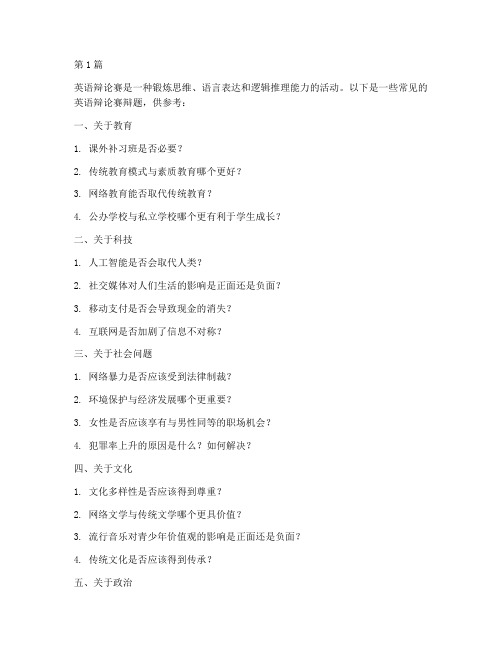
第1篇英语辩论赛是一种锻炼思维、语言表达和逻辑推理能力的活动。
以下是一些常见的英语辩论赛辩题,供参考:一、关于教育1. 课外补习班是否必要?2. 传统教育模式与素质教育哪个更好?3. 网络教育能否取代传统教育?4. 公办学校与私立学校哪个更有利于学生成长?二、关于科技1. 人工智能是否会取代人类?2. 社交媒体对人们生活的影响是正面还是负面?3. 移动支付是否会导致现金的消失?4. 互联网是否加剧了信息不对称?三、关于社会问题1. 网络暴力是否应该受到法律制裁?2. 环境保护与经济发展哪个更重要?3. 女性是否应该享有与男性同等的职场机会?4. 犯罪率上升的原因是什么?如何解决?四、关于文化1. 文化多样性是否应该得到尊重?2. 网络文学与传统文学哪个更具价值?3. 流行音乐对青少年价值观的影响是正面还是负面?4. 传统文化是否应该得到传承?五、关于政治1. 一国两制是否适用于香港、澳门?2. 民主制度与专制制度哪个更优越?3. 贸易战对全球经济的影响是正面还是负面?4. 国家是否应该干预互联网言论?六、关于个人成长1. 个人的成功是先天决定还是后天努力?2. 父母对孩子的教育方式是否应该一视同仁?3. 青少年是否应该接受心理辅导?4. 个人的兴趣爱好是否应该受到社会压力的影响?七、关于健康1. 饮食健康与生活习惯哪个更重要?2. 互联网成瘾是否应该被列为心理疾病?3. 健康生活方式是否应该从小培养?4. 国家是否应该加大投入,提高国民健康水平?八、关于历史1. 历史是否应该被铭记?2. 历史人物的评价是否应该客观?3. 历史事件对现代社会的启示是什么?4. 历史教育是否应该得到重视?这些辩题涵盖了教育、科技、社会、文化、政治、个人成长、健康和历史等多个领域,既具有普遍性,又具有一定的争议性。
在英语辩论赛中,辩手们可以通过对这些辩题的探讨,提高自己的思维能力和语言表达能力。
第2篇一、引言英语辩论赛是一种考验参赛者思维敏捷、语言表达、逻辑推理等能力的竞赛活动。
英文辩论赛辩题大全
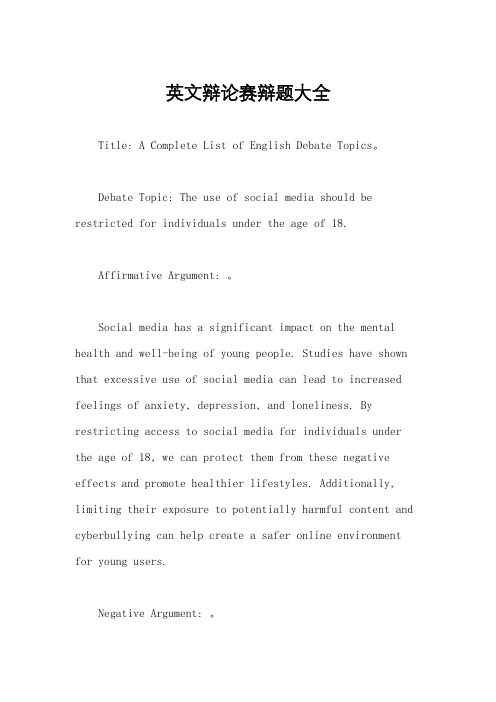
英文辩论赛辩题大全Title: A Complete List of English Debate Topics。
Debate Topic: The use of social media should be restricted for individuals under the age of 18.Affirmative Argument: 。
Social media has a significant impact on the mental health and well-being of young people. Studies have shown that excessive use of social media can lead to increased feelings of anxiety, depression, and loneliness. By restricting access to social media for individuals under the age of 18, we can protect them from these negative effects and promote healthier lifestyles. Additionally, limiting their exposure to potentially harmful content and cyberbullying can help create a safer online environment for young users.Negative Argument: 。
Restricting access to social media for individuals under the age of 18 would infringe upon their freedom of speech and expression. Furthermore, social media can also provide opportunities for young people to connect with others, express themselves, and access valuable educational resources. Instead of imposing restrictions, we should focus on educating young users about responsible and safe use of social media, as well as implementing better regulations and safeguards to protect them from harmful content and cyberbullying.In conclusion, the debate over whether to restrict the use of social media for individuals under the age of 18 is a complex and multifaceted issue. Both sides present valid arguments, and it is important to consider the potential benefits and drawbacks of such restrictions. Ultimately, the decision should be based on a thorough examination of the evidence and a consideration of the best interests of young people.。
英语辩论题目 (3)
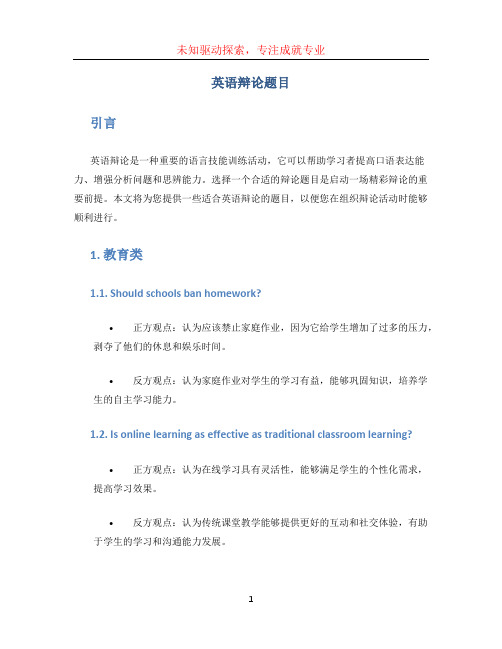
英语辩论题目引言英语辩论是一种重要的语言技能训练活动,它可以帮助学习者提高口语表达能力、增强分析问题和思辨能力。
选择一个合适的辩论题目是启动一场精彩辩论的重要前提。
本文将为您提供一些适合英语辩论的题目,以便您在组织辩论活动时能够顺利进行。
1. 教育类1.1. Should schools ban homework?•正方观点:认为应该禁止家庭作业,因为它给学生增加了过多的压力,剥夺了他们的休息和娱乐时间。
•反方观点:认为家庭作业对学生的学习有益,能够巩固知识,培养学生的自主学习能力。
1.2. Is online learning as effective as traditional classroom learning?•正方观点:认为在线学习具有灵活性,能够满足学生的个性化需求,提高学习效果。
•反方观点:认为传统课堂教学能够提供更好的互动和社交体验,有助于学生的学习和沟通能力发展。
2. 科技类2.1. Should robots replace human workers?•正方观点:认为机器人可以完成重复、危险和繁琐的工作,提高工作效率,减少人力成本。
•反方观点:认为机器人的智能无法替代人类的创造力、决策能力和人情味。
2.2. Is social media a positive influence on society?•正方观点:认为社交媒体有助于信息传播、社交互动和个人表达,促进社会发展和人际关系建立。
•反方观点:认为社交媒体容易导致信息泛滥、隐私泄露和社交隔离,对社会造成负面影响。
3. 社会类3.1. Should the voting age be lowered to 16?•正方观点:认为16岁的年轻人具有一定的思考能力和社会责任感,应该有权利参与选举。
•反方观点:认为16岁的年轻人缺乏足够的生活经验和政治意识,不适合参与选举。
3.2. Is animal testing necessary for scientific research?•正方观点:认为动物实验能够为科学研究提供重要的数据和结论,推动医学和科技的发展。
常见英语辩论赛辩题(3篇)
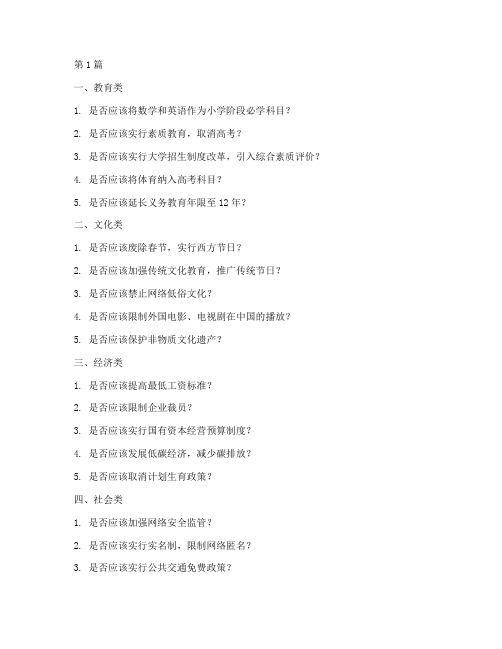
第1篇一、教育类1. 是否应该将数学和英语作为小学阶段必学科目?2. 是否应该实行素质教育,取消高考?3. 是否应该实行大学招生制度改革,引入综合素质评价?4. 是否应该将体育纳入高考科目?5. 是否应该延长义务教育年限至12年?二、文化类1. 是否应该废除春节,实行西方节日?2. 是否应该加强传统文化教育,推广传统节日?3. 是否应该禁止网络低俗文化?4. 是否应该限制外国电影、电视剧在中国的播放?5. 是否应该保护非物质文化遗产?三、经济类1. 是否应该提高最低工资标准?2. 是否应该限制企业裁员?3. 是否应该实行国有资本经营预算制度?4. 是否应该发展低碳经济,减少碳排放?5. 是否应该取消计划生育政策?四、社会类1. 是否应该加强网络安全监管?2. 是否应该实行实名制,限制网络匿名?3. 是否应该实行公共交通免费政策?4. 是否应该取消城市限行政策?5. 是否应该实行垃圾分类制度?五、国际关系类1. 是否应该加入世界贸易组织(WTO)?2. 是否应该支持自由贸易?3. 是否应该加强国际合作,共同应对全球气候变化?4. 是否应该支持发展中国家的发展?5. 是否应该加强国际反恐合作?六、科技类1. 是否应该禁止人工智能在军事领域的应用?2. 是否应该限制基因编辑技术?3. 是否应该加强网络安全,防止网络攻击?4. 是否应该鼓励发展可再生能源?5. 是否应该限制电子烟的生产和销售?七、政治类1. 是否应该实行多党制?2. 是否应该加强民主监督,防止腐败?3. 是否应该废除死刑?4. 是否应该实行财产公示制度?5. 是否应该限制政府权力,保障公民权利?八、环保类1. 是否应该实行垃圾分类制度?2. 是否应该限制塑料制品的使用?3. 是否应该加强环保宣传教育,提高公民环保意识?4. 是否应该限制化石燃料的使用,发展清洁能源?5. 是否应该加强国际合作,共同应对全球气候变化?九、医疗类1. 是否应该实行全民免费医疗?2. 是否应该加强医德医风建设,提高医疗服务质量?3. 是否应该加强公共卫生体系建设,提高应对突发公共卫生事件的能力?4. 是否应该限制医疗广告,保护患者权益?5. 是否应该鼓励发展中医药,传承中医药文化?这些常见英语辩论赛辩题涵盖了教育、文化、经济、社会、国际关系、科技、政治、环保和医疗等多个领域,为参赛者提供了丰富的素材和思考方向。
大学英语口语考试辩论话题内容

大学英语口语考试辩论话题内容14: Arguments for or against a ban on genetic engineering A:forB:againstA: Our world has entered into a new biological and social existence that is shaped by computers, mass media, and biotechnology.for example , Genetic engineering help people solve many things ,in’t it?B:well,but humans should not be modifying the genetic makeup of other organisms。
We should keep them in nature .A: Genetic engineering reduces costs of production. This means that the poor can afford more food, and be more self sufficient. They're tasty and nutritious Some are easy to raise specifically for food, or are easy to catch.it’s pecfctB:Human beings are themselves part of nature, creatures within creation. Human discovery and invention can be thought of as resulting from the exercise of God-given powers of mind and reason.A: though it ,we can Design what people want or need , Improve or add desirable characteristics,even Remove undesirable cha racteristics.it‘s the big deal .B:ok,I like things those are natural ,but Genetic Engineering is unnatural,I can with you . 15:Arguments for or against the view that women face unequal treatment in getting promoted:AagainstB:forA; In a modern society, one would think that sexual discrimination had long disappeared.But My mom didn't get the position she wanted again, theypromoted some new guy to the job. I think it’s not fair for women.B: However, this is not the case. Although women are given more chances than they had before. if a couple was divorce women can get 70% of her man's money! IN UK,SOi think every country's Culture are diffenent.OR other reasons.A;wow,no . do you know that western women did not have the same rights like Muslim women ,for example: Muslim women have right to keep her family name after marriage.Muslim women have right to have independent budget with out inquiring of her husband.B: so this is why some country man are king but some country women are king. becuase their culture are different.A:but in country especially in a traditional country like China Some women are still expected to stay at home when they married.why man?B: well,they are equal but they don't have the same rights as men just as men don't have the same rights as women. each of them has a role and the rights are given accordingly.16: Arguments for or against divorce as the solution to a loveless marriageSupporter for divorce=A: if marriage has no love ,marriage just is an afflict[ ?'flikt ]折磨for the person need love.so I think divorce is a better solution to a loveless marriage.Against divorce =B:Divorce do many harms to a family. whats more, The loveless marriage will free people from some obligation[ ??bli'gei∫n ]义务.so I think divorce is the worst r solution to a loveless marriage.A:if marriage has no love ,marriage just is an afflict[ ?'flikt ]折磨for the person need love. There is no care for each other andcomfortable communication to make life significant. whats more, the neglect between them buries bomb which will break out somedayB: divorce is not a reasonable solution. Everything has two sides. The loveless marriage will free people from some obligation[ ??bli'gei∫n ]义务.Besides ,the less you pay, the less emotional demands you have, which reduce disputeA: we marry not for the lifeless life. This also has harm to mental health of the coming generation.B: if one has no economic capability, divorce will destroy his life, so do their children and their old parents. Divorce hurt more people.A: the essential issue is loveless marriage having no happiness. Why not look for confident and wonderful life elsewhere?B: this is just personal interests, how can we don’t assume the responsibility for the marriage? Divorce will lead to more social problem.A;well,I still think the emotion is more important.but I accept you too.。
- 1、下载文档前请自行甄别文档内容的完整性,平台不提供额外的编辑、内容补充、找答案等附加服务。
- 2、"仅部分预览"的文档,不可在线预览部分如存在完整性等问题,可反馈申请退款(可完整预览的文档不适用该条件!)。
- 3、如文档侵犯您的权益,请联系客服反馈,我们会尽快为您处理(人工客服工作时间:9:00-18:30)。
第八届全国大学生英语辩论赛辩题Topics for the 2007 National English Debate Contest for College StudentsFor Side: We should celebrate western festivals.Against Side: We should not celebrate western festivals.For Side: The government should control rising house prices.Against Side: The government should not control rising house prices.For Side: The generation gap can be bridged.Against Side: The generation gap cannot be bridged.For Side: National identity is important in the age of globalization.Against Side: National identity is not important in the age of globalization.For Side: Work experience is more important than education.Against Side: Education is more important than work experience.For Side: Following fashion is necessary for young people.Against Side: Following fashion is unnecessary for young people.For Side: Sending children to famous schools is essential.Against Side: Sending children to famous schools is not essential.For Side: People are happier living in cities than in the countryside. Against Side: People are happier living in the countryside than in cities.For Side: The car industry should be further developed in China. Against Side: The car industry should not be further developed in China.For Side: College students should be allowed to live off campus. Against Side: College students should not be allowed to live off campus.For Side: Men contribute more to society than women.Against Side: Women contribute more to society than men.For Side: The college entrance examinations should be abolished. Against Side: The college entrance examinations should not be abolished.For Side: It's good for college students to have a part-time job.Against Side: It's not good for college students to have a part-time job.For Side: It's better for a college graduate to find a job than to undertake postgraduate study.Against Side: It's better for a college graduate to undertake postgraduate study than to find a job.For Side: Students should choose their majors to meet their personal needs and interests.Against Side: Students should choose their majors to meet the needs of society.For Side: Learning oral English is more important than learning written English. Against Side: Learning written English is more important than learning oral English.For Side: E-books will eventually replace printed books.Against Side: E-books will never replace printed books.For Side: The Chinese men's football team is hopeful.Against Side: The Chinese men's football team is hopeless.For Side: The “golden week” holidays should be abolished.Against Side: The “golden week” holidays should not be abolished.For Side: Non-native English speaking teachers are better than native English speaking teachers.Against Side: Native English speaking teachers are better than non-native English speaking teachers.第十三届“外研社杯”全国英语辩论赛辩题(round 0-8,semifianls and grandfinal)2009-06-0415:19:310. Campus Lifea. China abolish English as a compulsory subject in postgraduate entrance examinations.b. China make military training compulsory for all college students.c. All major corporations operating in China should be required to offer student internships.1. Culturea. THW require study of the traditional style Chinese writing.b. TH opposes the private ownership of artifacts deemed to be national treasures.c. THBT Shanzhai culture is bad for China.2. Educationa. THW base teachers‘s pay on their students‘s performance.b. THW make community service compulsory for all college students.c. THBT Chinese compulsory education should be extended to 12 years3. Economya. TH supports a new international trading currency.b. THB that China should stop buying US debt.c. China should issue consumption vouchers to stimulate the economy.4. Global climate changea. Developed nations should accept global warming refugeesb. Those affected by global climate change should have the right to sue major carbon-emitting nations.c. China should cap its carbon emissions.5. East Asiaa. Immediate elections are in Thailand抯best interest.b. ASEAN should expel Myanmarc. Direct negotiations between the US and North Korea are preferable to the Six-Party Talks.6. Family & Populationa. THBT women should be allowed to sell their eggsb. TH would require the father抯consent for abortions.c. China should legalize marriage between homosexuals.7. Crime & Punishmenta. Criminals sentenced to life imprisonment without parole should be allowed to choose death instead.b. China should establish a national DNA database of all citizens for the purposes of criminal investigations.c. This house would make parents liable for their children抯crimes.8. Governing & Governmenta. THW make one-year military service a qualification for public servants.b. TH would require government officials to make full financial disclosure to the public.c. THW make all NPC representatives full-time, professional legislators. Octofinals: Medical servicea. China should ban hymen reconstruction surgeries.b. China should legalize physician-assisted suicide.c. The World Health Organization (WHO) should have the authority to quarantine in times of health crises.Quarterfinals: Judiciarya. China should apply capital punishment only to homicide cases.b. China should fully establish a jury-by-peers system.c. Judges should be elected.Semifinals: International IssuesSEMIFINAL #1a. The Shanghai Cooperation Organization should admit Iran as a full member.b. The United Nations should take control of Jerusalem.c. NATO should fully withdraw from Afghanistan before 2012.SEMIFINAL #2a. The USA should stop promoting democracy as part of their foreign policy.b. Pre-emptive strikes on Somalia to curb piracy are justified.c. This house supports Spain抯criminal prosecution of members of the Bush administration.FinalsThe PRC should ban the production, sale and consumption of all tobacco products.第十五届“外研社·中国银行杯”辩论赛辩题集锦Demo: The International Olympic Committee should remove any age requirements for children to compete in the Olympics.表演赛:国际奥林匹克委员会应取消青少年参与奥林匹克竞技的年龄限制。
